-
TrackoBit
Manage commercial vehicles with the new-age Fleet Management Software
TrackoBit -
TrackoField
Streamline your scattered workforce with Field Force Management Software
TrackoField -
Features Resources
-
Blog
Carefully curated articles to update you on industrial trends. -
White Paper
Insightful papers and analysis on essential subject matters. -
Glossary
Explore an alphabetical list of relevant industry terms. -
What’s New
Get TrackoBit & TrackoField monthly updates here. -
Case Study
Explore the cases we solved with our diverse solutions. -
Comparisons
Compare platforms, features, and pricing to find your best fit.
-
About Us
Get to know TrackoBit: our team, ethos, values, and vision. -
Careers
Join the most dynamic cult of coders, creatives and changemakers. -
Tech Support
Learn about our technical support team and services in detail. -
Events
Check out the exhibitions where we left our marks and conquered. -
Contact Us
Connect with us and let us know how we can be of service.
What is ADAS? | Advanced Driver Assistance System
- Author:Anvesha Pandey
- Read Time:7 min
- Published:
- Last Update: January 3, 2025
Table of Contents
Toggle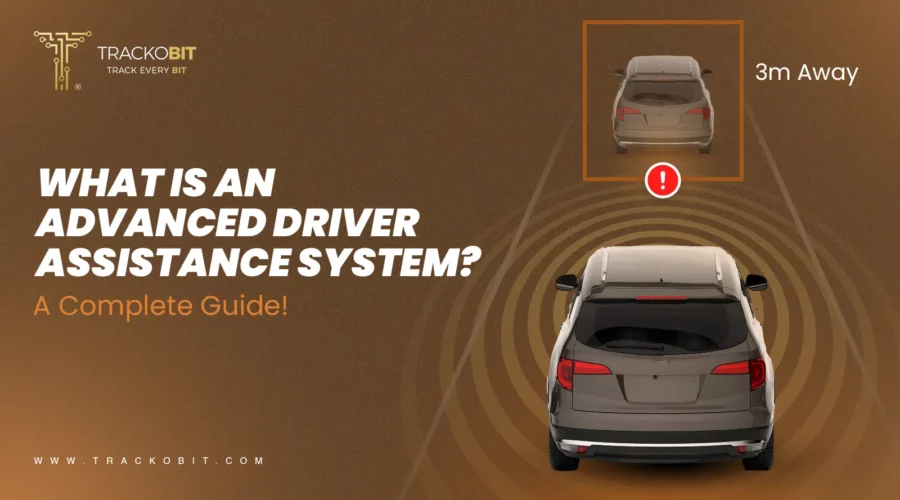
Looking for a piece that is like a detailed guide for ADAS systems? Go through this piece as it covers everything about advanced driver assistance systems.
Table of Contents
ToggleAdvanced Driver Assistance Systems (ADAS) represents a groundbreaking leap in the automotive industry. This technology has bridged the gap between traditional driving & fully autonomous vehicles.
These systems enhance driver safety, comfort & efficiency. They utilise cutting-edge technologies such as cameras, sensors, radars & AI.
From basic features like parking assistance to advanced capabilities like collision avoidance-
ADAS is transforming how we interact with our vehicles. And with adaptive cruise control, it continues to enhance the driving experience.
This piece is all about what ADAS entails, its various features, etc. So without any further ado, let’s get started.
What is ADAS?
ADAS – Advanced Driver Assistance System, is a collection of electronic technologies. These technologies enhance diver safety and driving experience.
These systems assist drivers in various tasks using sensors, cameras, and artificial intelligence. They monitor the vehicle’s surroundings, identify potential hazards, and more.
Here’s a glance of what ADAS is…
- ADAS (Advanced Driver-Assistance System) is a set of electronic functions.
- It relies on data collected by hardware.
- The system integrates with fleet management software.
- It enhances vehicle vigilance and visibility.
- ADAS helps to prevent collisions by increasing awareness of the vehicle’s surroundings.
ADAS helps build greater vigilance and visibility of vehicles on the road. This helps avoid collisions.
How Does ADAS Work?
Seeing is believing. And that is exactly what ADAS helps drivers and fleet managers do. Driving has become simpler and safer with dashcams.
Drivers no longer have to rely on mirrors and peek out of windows. Analysing the distance between the vehicle and objects is at a ‘beep’ distance.
ADAS works through an intricate connection between hardware, (proximity sensors and dashcams).
These components collaborate to provide enhanced safety and assistive features for the driver. It also relies on software, like video telematics.
Hardware picks up cues, such as the vehicle’s distance from the nearest surroundings. It can pick things such as other vehicles, pedestrians, traffic signals, lane lines, etc.
The data goes to the fleet management software. This further notifies the designated drivers or managers directly.
In advanced systems, these signals lead to the vehicles responding to prevent mishaps. These systems trigger manual or automated vehicle responses such as braking, steering, etc.
What are the Key Features of ADAS?
ADAS systems help enhance vehicle safety & improve the driving experience.
Some of the key features of ADAS include:
1. Adaptive Cruise Control
Adaptive cruise control helps maintain a safe distance from the vehicle ahead. It does this by automatically adjusting your speed.
2. Lane Departure Warning
This particular feature alerts the driver when the vehicle drifts out of its lane. Also, the Lane-Keeping Assist feature steers the vehicle back into the lane.
3. Collision Avoidance Systems helps
Collision avoidance systems include forward collision warning and automatic emergency braking. It also helps in detecting potential collisions & applies brakes to avoid escalations.
4. Blind Spot Detection
The blind spot detection feature monitors the areas outside the driver’s field of vision. It alerts the driver to vehicles in the blind spot, enhancing safety while driving.
5. Parking Assistance System
This feature includes rear-view cameras, parking sensors, and automatic parking capabilities. These tools help navigate tight parking spaces.
Altogether, these features reduce the risk of accidents. They also enhance the driving experience by improving comfort and efficiency.
What are the Components of ADAS?
ADAS relies on a combination of hardware and software components. These work together to sense, process, and respond to the driving environment.
Have a look at the components of the ADAS technology:
1. Sensors
The sensors form the backbone of the ADAS system. They are responsible for collecting data about the vehicle’s surroundings & internal state.
This process involves various types of cameras. These include forward-facing, rear-view, and surround-view cameras. These cameras help capture visual data for features like
- lane departure warning
- traffic sign recognition.
This includes radar sensors. They measure the distance and relative speed of objects using waves. It also includes LiDAR sensors. They create a 3D map of the surroundings using laser pulses.
2. Processor & Controllers
They help in analyzing sensor data to make real-time decisions. Electronic Control Units (ECUs) integrate sensor inputs.
They execute commands for functions like Collision Avoidance and Lane Keeping Assist.
On the other hand, Graphics Processing Units (GPUs) handle image & video processing. This streamlines object recognition. Centralized ADAS domain controllers manage multiple functions efficiently.
3. Actuators
Actuators execute commands, controlling braking, steering, and throttle. They handle safety-critical maneuvers like emergency braking or adaptive cruise control.
Communication systems like Vehicle-to-Everything (V2X) technology enable such actions. This helps connect vehicles to infrastructures, and other vehicles.
Internal systems like the CAN Bus ensure seamless communication between ADAS components. Wireless connectivity enables over-the-air (OTA) updates.
4. The Software & Algorithms
The intelligence of ADAS lies in its software & algorithms. Sensor fusion combines data from multiple sources to detect and classify objects. Whereas, machine learning & AI models help in predicting behaviors & making complex decisions.
What are the Benefits of ADAS?
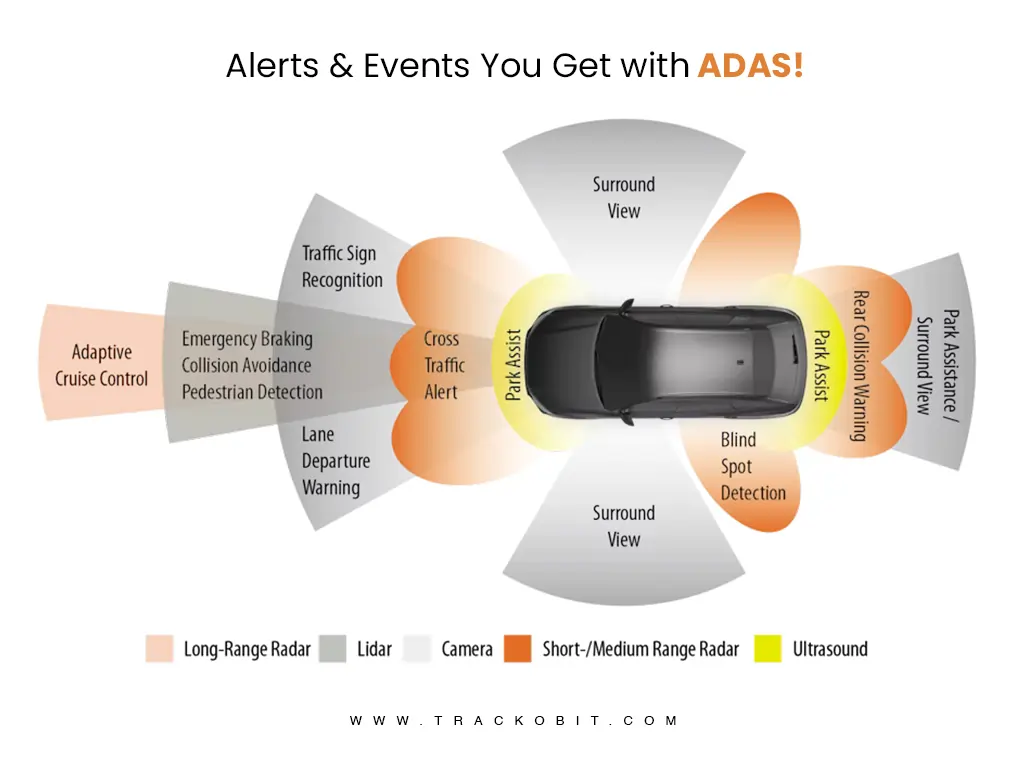
Events & Alerts You Get With ADAS
This particular technology offers many benefits, making it safer, more efficient & less stressful.
Here are some of the key advantages of the system-
1. Enhanced Safety
ADAS improves road safety by preventing collisions. It offers features like automatic emergency braking and forward collision warnings.
Additionally, it provides lane departure warnings to alert drivers. It also includes lane-keeping assist to ensure drivers stay within their lanes.
2. Improved Driver Awareness
These systems inform drivers with real-time alerts about potential hazards, pedestrians, and more.
When combined with a driver monitoring system, it becomes a powerful video telematics tool.
Monitoring features like drowsiness and distraction help encourage drivers to stay attentive. This further reduces the chances of accidents.
3. Reduced Driver Fatigue
Long trips & heavy traffic become less stressful with adaptive cruise control.
This helps in maintaining a safe following distance. Traffic jam assist automates low-speed driving in congested conditions.
These features make journeys more manageable & less tiring for drivers.
4. Lowers Operating Costs
By preventing accidents, ADAS reduces repair expenses and lowers insurance premiums. Additionally, these systems promote efficient driving habits. This further helps in enhancing the economy and reducing vehicle emissions. It also contributes to saving costs in the long run.
What Can You Expect From ADAS in the Future?
As ADAS evolves, we are closer to a fully automated, AI-powered driving experience. We can expect it to advance from current Level 2 and Level 3 systems.
In the future, Level 4 systems will enable vehicles to operate autonomously. Level 5 systems will be a level up further, allowing full autonomy in all driving conditions.
| 📍 Different Levels of the ADAS Technology-
Level 0: No automation, only driver warnings and alerts. Level 1: Assistance with steering or acceleration, not both. Level 2: Partial automation, controls steering and acceleration simultaneously. Level 3: Conditional automation, driver intervenes when prompted. Level 4: High automation, no driver needed in specific scenarios. Level 5: Full automation, no driver required at all times. Wondering where are we today? Currently, we operate at Level 2 automation. Some advanced systems reach Level 3 in specific scenarios. Levels 4 and 5 are still under development and testing. |
Integrating AI and machine learning will enhance decision-making. It will allow vehicles to analyze complex scenarios and continuously learn driver behavior.
Personalization and predictive analytics will further enhance the driving experience. They will tailor recommendations to user preferences and anticipate maintenance needs.
ADAS will also contribute to sustainability by promoting eco-driving. It will optimize fuel consumption and reduce emissions.
As of now, ADAS’s pros and cons co-exist. Although the technology promises a bright future, its development is not without challenges.
High implementation costs and dependency on infrastructure pose significant hurdles. Additionally, driver over-reliance adds to these challenges.
What are the Applications of ADAS?
Having an extra pair of eyes or extra sensory input while driving seems pretty cool, right? Wait till you see how advanced driver assistance systems enhance fleet use. Whether commercial or not, the potential is immense.
-
Easier Parking
The extra vigilance especially comes in handy when parking a vehicle. When all required hardware is in place, your ADAS is all set to work. They help by providing collision warnings.
This way, parking the vehicle becomes easier and safer.
-
Adaptive Cruise Control
In advanced telematics systems, ADAS helps maintain adaptive cruise control. What this does is that it manages the vehicle’s speed for the driver on a highway. Automatic speed changes occur after considering the surrounding objects near the vehicle. It also takes into account the speed limits of the area.
-
Safer Night Driving
Especially in foggy areas, driving at night becomes dangerous due to low visibility. However, ADAS removes some risk from these situations.
For example- even if the driver cannot see a forthcoming object, the cameras and software will!
-
Autonomous Vehicles
The whole idea of autonomous driving is based on ADAS. Through this system, vehicles can detect their surroundings. This allows them to figure out how to navigate accordingly.
Automated driving in autonomous vehicles has been long speculated. It is considered a major achievement in the automobile industry.
ADAS plays a huge role in building an autonomous fleet. However, as of now it is far from being automated driving itself.
What Are the Differences Between ADAS and Automated Driving
Let us look at the key differentiators:
-
Meaning:
Automated driving means the vehicle operates without human control.
ADAS includes functions that support automation but isn’t a complete system on its own.
-
Key Functions:
The whole point of automatic driving is that the vehicle moves. Infact no human intervention required.
ADAS, on the other hand, is mostly concerned with monitoring and surveillance.
-
Level of Control:
The whole idea of automated driving is that it completely takes over the vehicle.
Whereas, ADAS only helps enhance the driver’s capabilities.
-
Features:
Automatic driving comes with advanced features. These features can be highway driving and automatic parking.
ADAS features such as lane departure warning, adaptive cruise control & more.
-
Technology Required:
Sure, both automatic driving and ADAS need vehicle tracking software. This includes video telematics, AI, and ML to function.
However, Automatic cars require much stronger versions of these technologies. They also need highly specialized vehicles and mechanisms.
-
Actionability:
ADAS is already present in many commercial fleets and their management software. While Level 2-3 autonomous vehicles exist, fully automatic driving will take time
Now, let’s explore how ADAS differs from traditional safety systems.
A Comparison Between ADAS & Traditional Safety Systems
-
Purpose: Prevention vs Reaction
ADAS prioritizes prevention. It actively works towards avoiding accidents. It alerts the driver or takes control in critical situations. Features like lane-keeping assistance, and collision warning fall under this category.
In contrast, traditional safety systems react to accidents and damage after they occur.
For example, Airbags and seat belts. These are passive measures that activate during or after a collision.
-
Technology: Advanced vs Basic
ADAS technology utilizes advanced tools like sensors, cameras, radar, and AI. These provide real-time data and assist drivers. This allows for proactive intervention when potential risks are detected.
On the other hand, traditional safety systems rely on basic non-automated technologies. They solely focus on reducing harm once an incident has already occurred.
-
Functionality: Active vs Passive
ADAS actively monitors surroundings and intervenes to prevent accidents.
For example- Automatic emergency braking tops the car. Even in situations if the driver fails to react to an imminent collision.
Whereas, traditional safety systems are passive in nature. They remain dormant until a crash occurs.
-
Cost: Investment vs Repair Expense
The cost of ADAS involves higher upfront expenses. However, it represents a long-term investment due to its advanced technology. Yet, it significantly reduces risks & associated costs by preventing accidents.
Traditional safety systems incur higher repair costs post-accident due to their reactive nature.
Altogether, both systems play a vital role in vehicle safety. Traditional safety systems play a vital role in protecting passengers during accidents. However, ADAS is revolutionizing safety by focusing on accident prevention and proactive measures.
Empower Your Fleet and Drivers Today!
Having explored ADAS technology, it’s clear the world is evolving – and so should you!
It’s high time when you start prioritizing prevention. Utilizing this technology & enhancing the driving experience we can choose to be efficient. The technology ensures that vehicles & drivers are better equipped. In order to navigate challenges on the road.
Well, if you’re looking for top-notch video telematics solutions for commercial vehicles, TrackoBit offers advanced technology to enhance both driver safety and vehicle efficiency.
Revolutionize your fleet operations with real-time insights, alerts on events, and enhanced monitoring.
Transform how your vehicles & drivers operate.
FAQs on ADAS Technology
-
How does ADAS improve fuel efficiency?
By optimizing driving patterns, ADAS maintains a consistent speed through adaptive cruise control. This reduces unnecessary acceleration and braking.. This leads to better fuel efficiency.
-
Can ADAS be upgraded over time?
Yes, many ADAS features can be updated via software updates. These updates are delivered over-the-air (OTA) or through service centers. Further allowing vehicles to access new features and improvements.
-
Is ADAS compatible with all vehicles?
ADAS is compatible with modern vehicles. Older vehicles may require significant upgrades. These upgrades are necessary to support advanced systems like cameras, sensors, and more.
Anvesha is a communication specialist at TrackoBit. With a strong background in media and communications, she adds much-needed balance and brevity to TrackoBit’s... Read More
Related Blogs
-
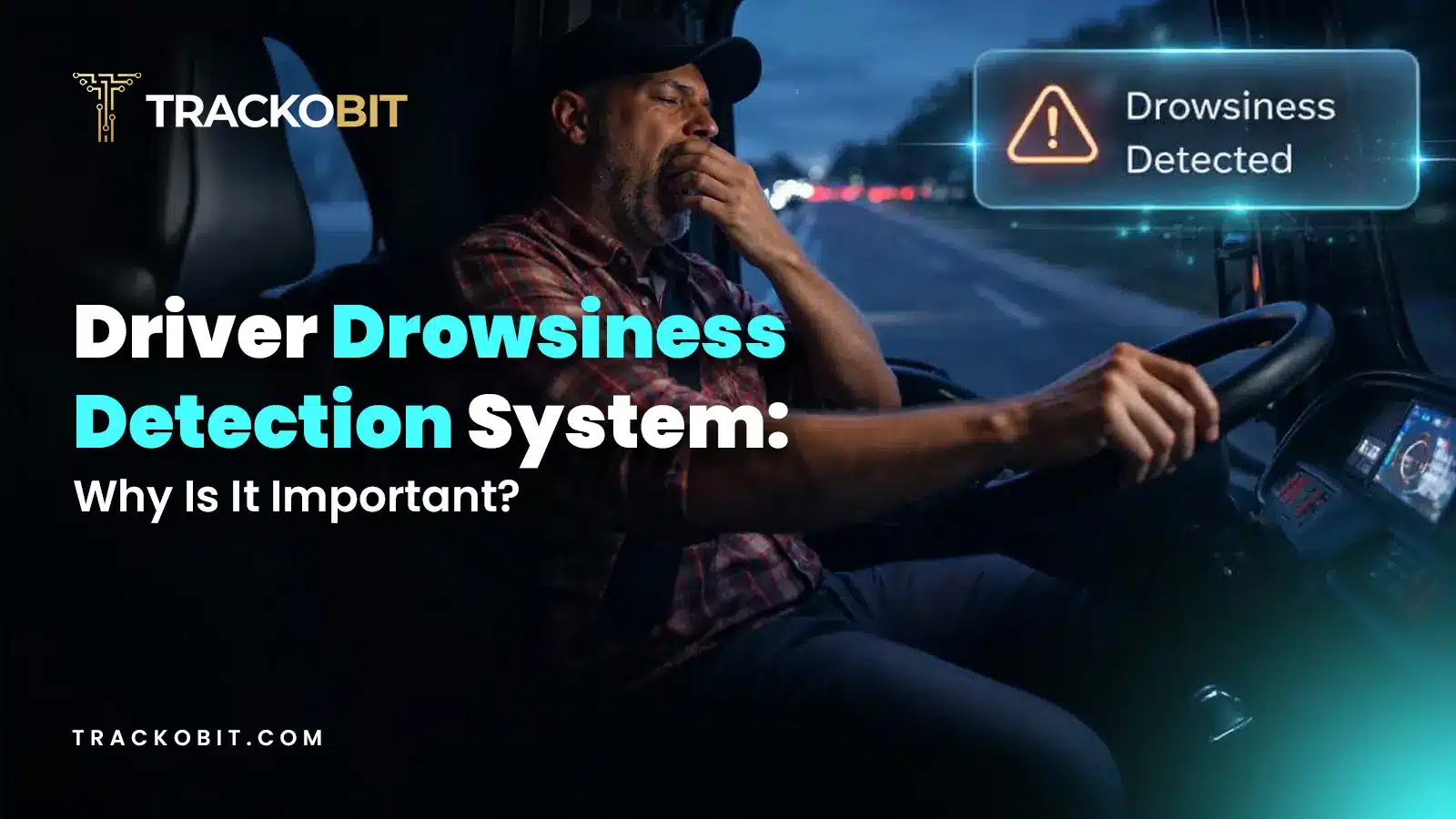
Why is Driver Drowsiness Detection System Important for Fleet Management?
Shemanti Ghosh February 4, 2026A driver drowsiness detection system is critical for fleet management. It helps prevent fatigue-related accidents and reduces operational risks through…
-
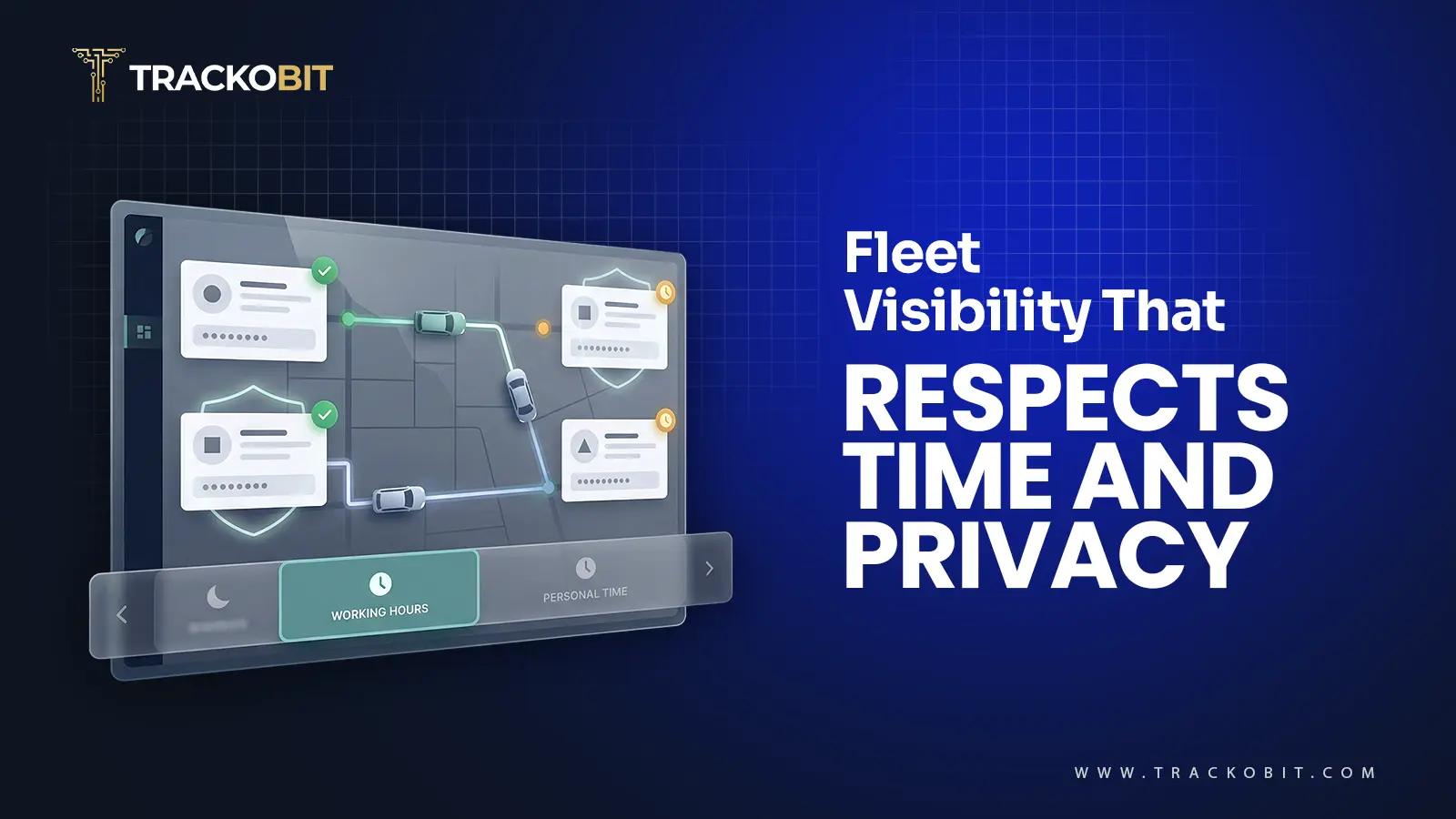
When Tracking Needs a Clock: Rethinking Fleet Visibility
Tithi Agarwal December 24, 2025Read on to understand why fleet tracking works better when it follows working hours. Because visibility should support operations, not…
-

What Makes TrackoBit’s Video Telematics Software Truly Next-Gen?
Shemanti Ghosh December 17, 2025TrackoBit’s video telematics software blends smart video intelligence with full server control. The result? Superior fleet reliability and safety.
-
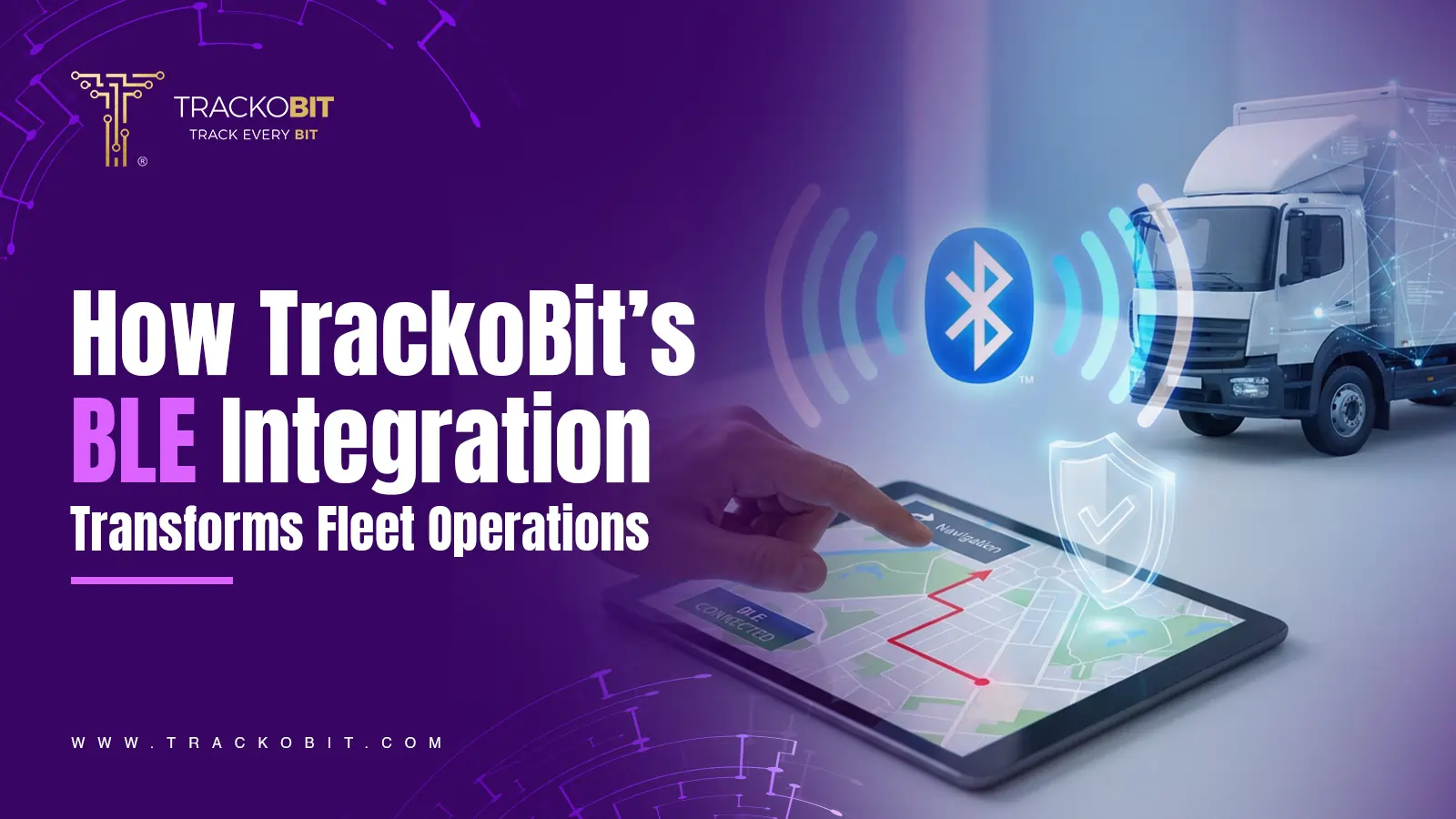
Plug, Pair, Perform TrackoBit Introduces BLE Sensor Integration
Tithi Agarwal November 26, 2025TrackoBit’s BLE Sensor Integration enables wireless, real-time monitoring with faster installs and accurate insights. It improves fleet efficiency, visibility, and…

Subscribe for weekly tips to optimize your fleet’s potential!
Your inbox awaits a welcome email. Stay tuned for the latest blog updates & expert insights.
"While you're here, dive into some more reads or grab quick bites from our social platforms!"Stay Updated on tech, telematics and mobility. Don't miss out on the latest in the industry.
We use cookies to enhance and personalize your browsing experience. By continuing to use our website, you agree to our Privacy Policy.





































